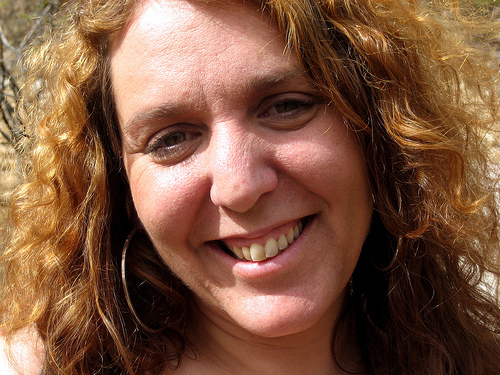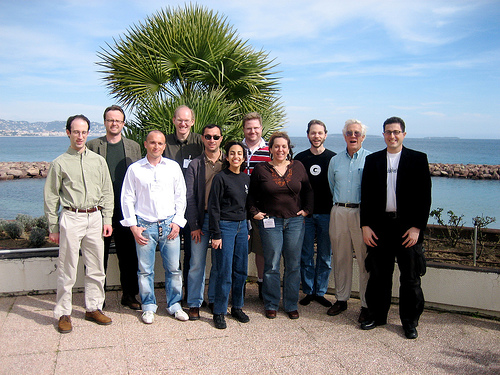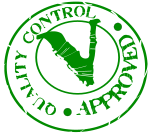Molly E. Holzschlag: Evangelist and Educator

Interview with Molly E. Holzschlag from Opera Software (October 13th, 2009).
Nálepky:
Můžete si přečíst také český překlad. There is Czech translation available.
When did you discover the World Wide Web?
I discovered the Web pretty early, in 1993. I had been working in IT since 1988 and I had been interested in the online world. I got involved in developing content for Gopher and other aspects of the Internet and ended up being involved when the Web came along.
The company I worked for at the time said: „Oh, that Molly, she knows a little bit about the Internet, why don’t you give her the task of learning this Web stuff?“ This was in early 1993 before we even had a visual browser! So I was working with the terminal browser, Lynx. The Web was accessed from the command line and viewed on your terminal.
You have written books about the Web. Do you remember how many books have you written?
I have written 35 titles, either as a solo author or in some cases I worked with other authors such as with The Zen of CSS Design. I co-wrote that book with the fabulous Dave Shea from the CSS Zen garden. The following book, Transcending CSS was written with Andy Clarke and has also been successfuly and richly designed by Andy into one of the most visually beautiful books on Web design.

From Molly’s photoalbum
It has to be really boring to write so many books about one subject, isn’t it?
Well, the thing is I just never got it right! Hopefully by the 135 I will have it right. (laughing)
Which one of your books do you like most?
There are so many and each one has been a different experience. But I will go to the most recent and most familiar ones and I would have to say that working with Dave Shea on The Zen of CSS Design was clearly one of the most rewarding of all.
As it turns out, Dave was inspired by my very second book. As he tells it, seeing that book influenced him to become a web designer. With the CSS Zen Garden site, he created something that changed the world as we know it. For me, it was an experience where I, the teacher, became the student and he in turn became the Zen Master. I really learned a great deal from him and it was a wonderful experience as a result.
Do you remember when you decided to start writing books and why?
Yes, I received an email in 1994 from Prima Publishing. Imagine, this was before companies really even had websites, so you couldn’t go to the publisher’s website to find information.
So I get this email and it said: „Hi, I’m the publisher of Prima Publishing and I have heard that you are the one to write our next web design book.“ At this point there were maybe 5 web design or HTML books in the market at all.
When I got this email I thought he must be kidding. I ran out to the local bookstore and I looked up Prima Publishing. Sure enough there was his name listed as publisher inside of the books! Then I wrote back and next day I had my first book contract. And so my book writing career began.
You are invited expert to the W3C, aren’t you?
Originally I was an invited expert. Now, because I work for Opera, my affiliation with the W3C is changed to member, because Opera is a member company.
My work as an invited expert actually began under Richard Ishida in Internationalization GEO Working Group, which is the education and outreach group for internationalization. He was really the one that brought me to the W3C and I have so much respect for him. But, internationalization is not where I had strengths. Within a few years it became clear that I would be better in a Working Group where I had the strengths and capabilities, so I went to CSS WG. And also to HTML5 WG, just to keep my eye on what they are doing.
I am not actually working on specs so much as I am working with spec writers and implementors to have a better prioritization and understanding of the web developer and designer world. My contributions are more in terms of evangelism and education. I create relationships between developers and designers and the W3C. I help the W3C’s technical leads and implementors to understand a little bit more about what it is designers and developers want and need.

Molly (the 4th from the right) with CSS WG (from Molly’s photoalbum)
Some people criticize the W3C. What do you think about the W3C? Are there some things that can be improved?
Absolutely, I think the infrastructure needs better liaisons between the different groups. I would like to see more openness with the community. These are things that are going on now in the W3C, it just takes a long time to change organizations.
I think the financial model needs to be re-examined as does the communications model.
While we can be critical of the W3C, it doesn’t do very much to just criticise. We must also figure out ways to become involved. I think that there is a lot of room for that and people don’t realize that W3C is open to participation via its lists, and some Working Groups, such as HTML5, allow anyone to become involved.
You are also member of the Web Standards Project (WaSP).
I am a former group lead, and have „retired“ from the group, but still hold the title of Emerita. We have a saying „Once a WaSP, always a WaSP!“
Jeffrey Zeldman and a number of very progressive thinkers started this group. I became involved around 2000 when Jeffrey was ready to leave and he was looking for some new blood. He asked me and several others to join.
What is the purpose of the Web Standards Project? We have the W3C, why we need WaSP?
Excellent question. It’s about being liaisons and advocates. The W3C was not chartered to be educators and do outreach to the working community. For the most part, the W3C are the implementors, the creators of specifications and recommendations. But as an organisation were never meant to do evangelism, even when many individuals within the W3C do that because they are passionate. But really, how many web designers and developers want to go read W3C specs after a long day of work? We just want to do our jobs. This is why WaSP, and other standards groups and organizations have come about.
WaSP announced the creation of an education project called Interact this year. This is an absolutely astonishing program that can be used by educators worldwide to create university curriculum on Web standards. Opera Software is involved in the education mission too, providing education materials for free under the Web Standards Curriculum (WSC). These activities are really helping the W3C translate spec speak into human speak, as well as adding plenty of real-world practical wisdom for those who actually build sites.
You worked several years for Microsoft and for Internet Explorer team. What was your position there?
I was consultant to the team and basically I was brought on board during the transition from IE6 to IE8. I wasn’t working specifically with the IE team. I was working with Microsoft product development in general. I worked on the variety of their products, meeting with teams to advise or help prioritize standards-based features.
What other products?
I have spoken with the Expression Web folks, and they have done some very good work related to standards and CSS. I have also talked with the Visual Studio folks and we have made some changes there.
With IE it was all about the prioritization of CSS and HTML pieces that had not been implemented in IE6, that needed to be implemented in IE7, and then moving from IE7 to IE8. IE8 really went in a very good direction for a standards based browser, especially in its CSS support.
Recently you moved to Opera Software. Why and what is your new position there?
I am a Web Evangelist in developer relations. Opera and I had been in talks for many years and part of the issue there has been that I have been an independent. I didn’t worked for Microsoft, I was never an employee. With Opera, it was about becoming an actual employee. I have worked for my own company since my twenties. I am now 46 years old and this is a first time in my adult life that I have taken a „real“ job!
Opera is an amazing company, its a company that has incredible commitment to open standards and an open Web. I get the opportunity to basically do exactly what I have long been doing, but with more resources behind me and with a team of terrific colleagues.

Molly at MIX n‘ Mash event, center, with Bill Gates (from Molly’s photoalbum)
Years ago there was a small affair on your blog, because you have criticized Steve Ballmer. What happened?
I criticized a comment that Steve had made: „We will win the Web.“ I called out to the public and I pointed out that there is no Web to win, the Web belongs to all of us.
When you are at the top of a company, when you are CEO, it’s too easy to become concerned with competition rather than the importance of the technology. This is not just with Microsoft, this is about every company in the world. There has been some growth in Mr. Ballmer within past years. I have seen an acknowledgement of change as he and others begin to understand better what the needs of developers really are.
A similar event happened later on, when I challenged Microsoft openly about IE8, after Bill Gates had made a public promise at the very first MIX event that he would not allow developers to go without information. Gates promised iterations of the browser and open communication. Then Gates started working more on Bill Gates Foundation, which is extraordinary and admirable. I am very glad that he is doing that, but of course some of his messaging about opening up got lost in the transition. So when I got to meet with him I asked him about that problem and upset quite a few people in the process. But ultimately it was something that had to be said and it really helped the world find out about IE8’s features and issues far sooner than they would have.
I retain my friendships with many people at Microsoft and here I am, at a Microsoft event as a speaker. Maybe this is the very first time that an Opera employee has ever done that. (Note: Interview occured during Microsoft conference MIX09, where Molly held CSS workshop.)
I have heard you like Prague. Why and have you ever visited Prague?
I certainly want to visit Prague, everything I have heard about it is interesting. I come from a Jewish background and am quite fascinated by the historic Jewish section of the city. I also have family history there, as the writer Franz Kafka was a cousin in my maternal lineage. From a very young age I have been fascinated with Prague as a place of intrigue.
I really want to come to Prague, I have made good friends in the Czech Republic. Opera even has an office there. I really want to explore what’s there both from a personal perspective and a technological and web-oriented one, too.
Thank you for the interview.
Thank you Martin.
Martin Hassman was interviewing Molly E. Holzschlag during MIX09.



